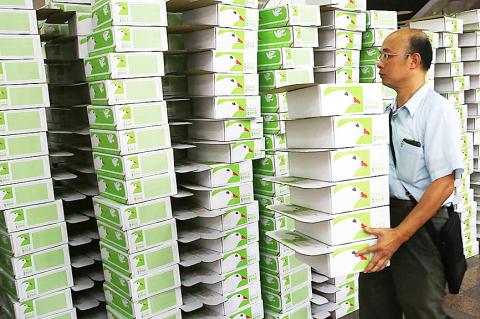The Chinese Nationalist Party (KMT) yesterday delivered more than 1.45 million signatures for three referendum proposals it has launched, saying the support it received was proof of public grievance against the Democratic Progressive Party (DPP) administration.
A proposal to promulgate air pollution regulations received 496,444 signatures, while a proposal calling for a halt to the construction of a coal power plant in New Taipei City’s Rueifang District (瑞芳) was backed by 482,507 signatures, KMT Vice Chairman Tseng Yung-chuan (曾永權) told a news conference in Taipei.
A proposed referendum to maintain a ban on food products from five Japanese prefectures that was imposed after the 2011 Fukushima Dai-ichi nuclear disaster obtained 478,015 signatures, Tseng said.

Photo: CNA
All three garnered signatures far surpassing the threshold of 281,745 — 1.5 percent of the eligible voters in the most recent presidential election — for a referendum proposal to pass the second-stage threshold and be put to voters, he said.
“All three proposals concern matters of people’s livelihoods and transcend the traditional blue-green political divide,” said KMT Vice Chairman Hau Lung-bin (郝龍斌), who initiated the proposal to maintain the import ban.
It was the DPP administration’s disregard of public health that forced people to resort to referendums to protect themselves, Hau said, adding that there were also DPP supporters who backed his signature drive.

Photo: CNA
KMT caucus whip Johnny Chiang (江啟臣), who is also director of the party’s Central Policy Committee, said the strong support received by the three drives underscored the public’s desire to live a better and healthier life.
The KMT hired four trucks to deliver the signatures to the Central Election Commission and sent staff members to watch over the signatures as the commission processed and calculated them.
According to the Referendum Act (公民投票法), the commission is required to finish examining the signatures within 30 days of receiving them and announce the establishment of the referendum within 10 days of determining that it has met the second-stage threshold.
The result of a referendum will be declared legitimate if 25 percent of eligible voters cast ballots and a majority votes in favor of it.
The Central Election Commission has said that proposals received by Friday have the best chance of being on ballots in the nine-in-one local elections on Nov. 24.

Taiwanese were praised for their composure after a video filmed by Taiwanese tourists capturing the moment a magnitude 7.5 earthquake struck Japan’s Aomori Prefecture went viral on social media. The video shows a hotel room shaking violently amid Monday’s quake, with objects falling to the ground. Two Taiwanese began filming with their mobile phones, while two others held the sides of a TV to prevent it from falling. When the shaking stopped, the pair calmly took down the TV and laid it flat on a tatami mat, the video shows. The video also captured the group talking about the safety of their companions bathing

US climber Alex Honnold is to attempt to scale Taipei 101 without a rope and harness in a live Netflix special on Jan. 24, the streaming platform announced on Wednesday. Accounting for the time difference, the two-hour broadcast of Honnold’s climb, called Skyscraper Live, is to air on Jan. 23 in the US, Netflix said in a statement. Honnold, 40, was the first person ever to free solo climb the 900m El Capitan rock formation in Yosemite National Park — a feat that was recorded and later made into the 2018 documentary film Free Solo. Netflix previewed Skyscraper Live in October, after videos

Starting on Jan. 1, YouBike riders must have insurance to use the service, and a six-month trial of NT$5 coupons under certain conditions would be implemented to balance bike shortages, a joint statement from transportation departments across Taipei, New Taipei City and Taoyuan announced yesterday. The rental bike system operator said that coupons would be offered to riders to rent bikes from full stations, for riders who take out an electric-assisted bike from a full station, and for riders who return a bike to an empty station. All riders with YouBike accounts are automatically eligible for the program, and each membership account

A classified Pentagon-produced, multiyear assessment — the Overmatch brief — highlighted unreported Chinese capabilities to destroy US military assets and identified US supply chain choke points, painting a disturbing picture of waning US military might, a New York Times editorial published on Monday said. US Secretary of Defense Pete Hegseth’s comments in November last year that “we lose every time” in Pentagon-conducted war games pitting the US against China further highlighted the uncertainty about the US’ capability to intervene in the event of a Chinese invasion of Taiwan. “It shows the Pentagon’s overreliance on expensive, vulnerable weapons as adversaries field cheap, technologically